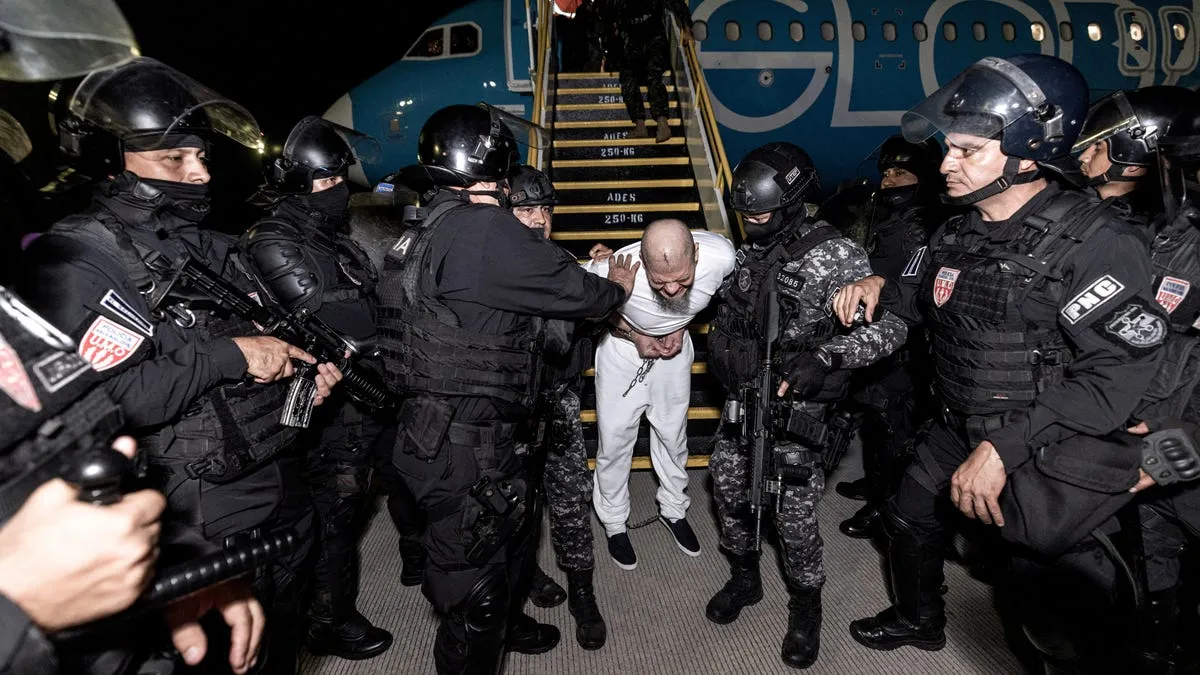
In a crowded courtroom located within a U.S. Immigration and Customs Enforcement (ICE) detention facility in suburban Denver, an immigration judge, Joseph Imburgia, called out for the next case: “Jefferson José? Jefferson José?” The silence was palpable, as no one answered. The absence of Venezuelan migrant Jefferson José Laya Freites, 33, for his asylum-and-detention hearing raised immediate concerns among legal advocates and family members.
According to attorney Monique Sherman from an immigrant rights group, Laya Freites' wife believed he had been transferred to Texas following a traffic stop in the Denver area and subsequently sent to a notorious prison in El Salvador. This alarming transfer occurred after Trump administration officials signed a significant $6 million detention deal with El Salvador to hold U.S. detainees, raising serious questions about the treatment of migrants.
During the court session, when Judge Imburgia sought clarity from federal prosecutor Tanga Bernal, she stated that Laya Freites had been released to local authorities. However, when pressed for details, Bernal indicated she needed approval from her superiors, leading to Judge Imburgia's frustration as he noted, “I don't know where he is and he's on the docket today.” The government, he insisted, needed to provide evidence regarding the whereabouts of this individual.
The case of Laya Freites is not isolated; across the U.S., many individuals have been vanishing from the immigration system, only to re-emerge in one of El Salvador's most notorious prisons. Reports indicate that the administration's claims of deporting large numbers of violent gang members, particularly from the Venezuelan gang Tren de Aragua, lack substantial evidence. Investigations by USA TODAY revealed that law enforcement agencies had identified fewer than 135 members of this gang, contrary to the administration's assertions of deporting over 200 members in a single week.
Family members of deportees, including Laya Freites' wife, emphasize that many individuals targeted by officials are not connected to gangs but are instead rounded up based on tattoos that commemorate personal milestones or interests, such as soccer teams and family. Laya Freites and his wife fled Venezuela 15 months ago, seeking asylum and were granted valid work authorizations. On January 28, while driving home from work, they were detained by federal agents despite their legal status.
After a month in the Aurora ICE facility, Laya Freites and his cousin were transferred to Texas, where they were informed of their impending deportation. However, a shocking twist occurred when Laya Freites' son recognized him in a video posted by Salvadoran officials, which showed him in a prison setting. His wife, remaining anonymous out of fear of retaliation, described the situation as a “kidnapping,” emphasizing that her husband has no gang affiliations or tattoos.
Legal experts, including Margaret Cargioli from the Immigrant Defenders Law Center, have condemned the actions of federal authorities, labeling them a “human rights injustice.” They argue that individuals are being snatched from the U.S. and sent to a third country without due process. The lack of transparency surrounding deportations has led to widespread concern, particularly regarding the treatment of those sent to El Salvador.
Tren de Aragua, or TdA, is a gang that emerged from Venezuela's prison system and has gained notoriety for its involvement in extortion, smuggling, and drug trafficking. While the group has been linked to various crimes in the U.S., law enforcement agencies have noted that its presence is minimal compared to more established gangs like MS-13. In fact, the Trump administration’s portrayal of the gang as a significant threat has been challenged by evidence showing that the group is still in the early stages of establishing itself in the U.S.
As the situation evolves, families of deported individuals continue to fight for justice. For example, Franco José Caraballo, 26, who had complied with all immigration checks, was taken into custody despite having no criminal record. His deportation to El Salvador, justified by authorities as a precaution against gang affiliation, has left his family devastated. Caraballo’s tattoos, which commemorate personal milestones, were misinterpreted as evidence of gang ties.
With over 760,000 Venezuelans seeking asylum in the U.S. since 2021, the plight of families continues to highlight a broader issue of immigration policy and human rights. Advocacy groups are urging for greater accountability and transparency from federal officials regarding deportations, especially those involving vulnerable populations fleeing violence and oppression.
The troubling cases of Jefferson José Laya Freites and others underscore the urgent need for reform within the U.S. immigration system. As families grapple with the ramifications of these policies, the call for justice and humane treatment of migrants remains paramount. Advocates argue that every individual deserves a fair hearing and that the government must be held accountable for its actions.